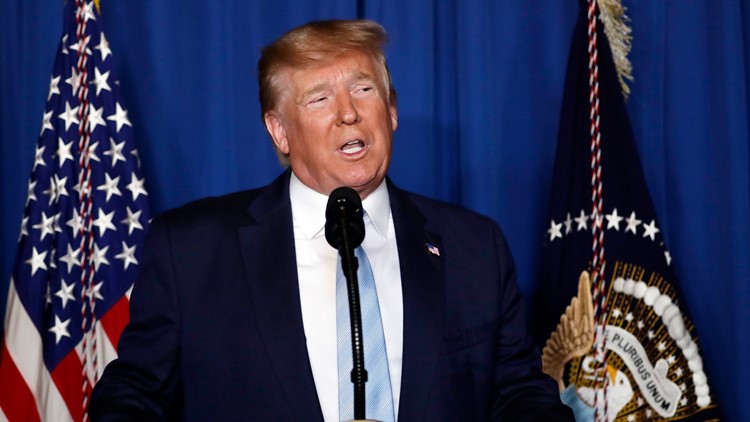INDIANAPOLIS — The relationship between Donald J. Trump and Hoosier Republicans is, well, complicated.
Last week, five days before a grand jury in Georgia increased the number of criminal charges for Trump to 91 felonies from 78, the Indiana GOP U.S. Senate frontrunner Jim Banks doubled down. “President Trump endorsed me early in my campaign, and I endorse President Trump as well, and he has my full support,” Rep. Banks told a press scrum after his speech, making no mention of former Indiana governor Mike Pence, one of a dozen challengers to Trump for the 2024 presidential nomination.
When Trump ran in the 2016 Indiana presidential primary, his institutional support was former GOP chairman Rex Early and Sullivan County Chairman Bill Springer. Gov. Pence was backing U.S. Sen. Ted Cruz. RNC committeeman John Hammond III called Trump “unfit” for the presidency and acknowledged that some GOP flanks were open to a “strongman.” Allen County Chairman Steve Shine said Trump was a release valve, allowing people to “vicariously vent their frustrations.” Former congressman Mark Souder said in an October 2015 Howey Politics column, “He’s no sheep in wolf clothing. He’s a wolf in wolf clothing.” Longtime GOP operative Pete Seat observed in another Howey Politics column, “Americans simply love villains and in Donald Trump they have found one.”
Trump's most ardent supporters appeared to be legendary coaches Bobby Knight, Gene Keady and Lou Holtz.
And then in the May 2016 Indiana presidential primary, he clinched the nomination, winning 53% of the vote against three other candidates. Gov. Pence joined his ticket, bringing with him crucial evangelical support, helping Trump secure the most improbable upset in American history while helping Eric Holcomb defeat John Gregg in the gubernatorial race and Todd Young's Senate race upset of dynastic Democrat Evan Bayh.
The fledgling administration was formed with some two dozen Hoosiers at cabinet and sub-cabinet level positions and on the White House staff. U.S. Sen. Dan Coats would become director of National Intelligence; Alex Azar would head the sprawling Health & Human Services; Dr. Jerome Adams would be surgeon general; Seema Verma, director of Medicare/Medicaid; Ted McKinney would be under-secretary at the USDA; Kip Tom was named ambassador to the United Nations food program.
It was a rollicking four years, with the Trump administration facing the COVID-19 pandemic and an array of controversies resulting in two impeachments. The president would fire Director Coats by tweet.
After losing the 2024 election by more than 7 million votes and 306-223 in the Electoral College, Trump commenced a path that resulted in the Jan. 6 U.S Capitol insurrection and a banana republic-style coup d’etat that would ultimately be thwarted by Republicans, including Mike Pence.
As the smoke cleared from the Capitol insurrection, Hoosiers serving in the Trump administration began to bail. Pence said in March at the Reagan Library, “President Trump was wrong. I had no right to overturn the election. What happened that day was a disgrace.”
Verma said she was “repulsed” by the Jan. 6 mob. Azar resigned, citing in his letter to Trump, “The attacks on the Capitol were an assault on our democracy and on the tradition of peaceful transitions of power.” Dr. Adams cited the “Trump hangover.”
Asked by The New York Times earlier this year if renominating Trump would be a mistake, John Hammond said, “We can’t be a cult of personality any longer.” Coats, writing a New York Times op-ed in October 2020, said, "The most urgent task American leaders face is to ensure that the election’s results are accepted as legitimate. Electoral legitimacy is the essential linchpin of our entire political culture."
On Tuesday, U.S. Sen. Todd Young told Republicans that Trump was poised to lose the 2024 election if nominated for a third time, suggesting to the IndyStar, “Someone who can actually win come next November.”
But not all have bailed. In addition to Rep. Banks, the gubernatorial field rallied to Trump. U.S. Sen. Mike Braun called the Georgia indictments "another attempt by President Biden and his party’s prosecutors to put their leading political rival behind bars and interfere with the 2024 presidential election." Lt. Gov. Suzanne Crouch told the NWI Times that DOJ was in a “war on conservatives” that “continues unabated and without shame.” Fort Wayne businessman Eric Doden said the charges "degrade our entire election process."
These candidates fear alienating the Trump base.
In Georgia, two Republicans - Gov. Brian Kemp and Secretary of State Brad Raffensperger - both refused to go along with Trump's scheme to subvert the will of voters in 2020-21. They were appalled at Trump’s 2020 actions that lost two GOP Senate seats and the majority. Both earned Trump's wrath. And both were reelected in 2022 by landslide margins.
Gov. Kemp said on Tuesday, “The 2020 election in Georgia was not stolen. For nearly three years now, anyone with evidence of fraud has failed to come forward — under oath — and prove anything in a court of law. Our elections in Georgia are secure, accessible, and fair and will continue to be as long as I am governor. The future of our country is at stake in 2024 and that must be our focus.”
And Raffensperger tweeted, “The most basic principles of a strong democracy are accountability and respect for the Constitution and rule of law. You either have it, or you don’t.”
Brian Howey is senior writer and columnist for Howey Politics Indiana/State Affairs. Find Howey on Facebook and Twitter @hwypol.



